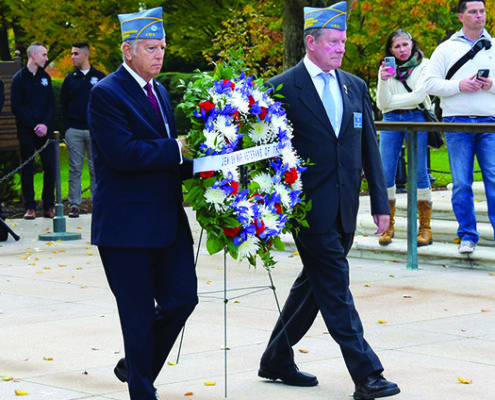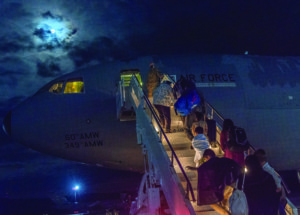By Cara Rinkoff, Managing Editor
The Jewish War Veterans successfully hosted this year’s Veterans Day commemoration at Arlington National Cemetery. Last year veteran service organizations (VSO) were only allowed to have one representative apiece due to the COVID pandemic. This year there were still restrictions, but the annual ceremony had a greater sense of normalcy to it.
JWV National Commander Alan Paley sat on the dais in the cemetery’s amphitheater next to the Department of Veterans Affairs Secretary Denis McDonough. In a special section for members of the co-hosting organization, JWV had multiple representatives, including National Vice Commander Nelson Mellitz and his wife Debbie, Art and Roz Kaplan, and National Executive Director Ken Greenberg and his wife Janet. Department of Wisconsin Commander Kim Queen and his wife Ilene also attended the ceremony.
In addition to delivering remarks at the event, Paley led the Pledge of Allegiance, and both he and Mellitz placed a wreath at the Tomb of the Unknown.
In the introduction to Paley’s remarks, the speaker recognized that 2021 marked the 125th anniversary of the Jewish War Veterans and noted that we are the oldest, continuously active veterans’ organization in the United States.
Paley then delivered the following remarks.
“President Biden, Secretary McDonough, Director Aguilera, distinguished guests, my fellow veterans, ladies, and gentlemen.
On Veterans Day, at the 11th hour on the 11th day of the 11th month, we pause for a few brief moments to both honor and pay tribute to the men and women who served in the defense of our country and then returned home. We owe you our thanks, our respect, and our freedom.
George Washington spoke about the country’s obligation to care for its veterans and their families, he said: “The willingness with which our young people are likely to serve in any way, shall be directly proportional to how they perceive the Veterans of earlier wars were treated and appreciated by their nation.”

Paley and Mellitz place wreath at Tomb of the Unknown. Photo by Christy Turner.
Let us remember, “Treated and appreciated.”
Engraved on the granite wall of the Korean War Memorial a short distance from here is the simple but powerful phrase “Freedom Is Not Free.” The freedoms we enjoy today, were made possible by the more than 19 million living veterans, and countless others who served in the defense of our country.
The symbols of America and freedom are interlocked, and they are present here today. The flags flying, the white grave markers, and ALL OF US – the veterans and servicemembers who protected our nation.
It is you that we celebrate and honor today.
Our work continues as citizens in supporting America’s veterans and servicemembers. JWV and VSO’s must continue to fight for adequate funding for VA services and assure that issues facing veterans from all eras remain at the forefront. I call on each of you to take action and make your voice heard on issues we continue to face, including ending homelessness, increasing access to healthcare, delivering mental health care, reducing claims processing times, deploying integrated electronic health records and addressing toxic exposure concerns in a comprehensive way.
Seated throughout the amphitheater this morning are the leaders of many Veteran’s Service Organizations.
Every VSO was created with the purpose to advocate for the unique needs of the Veteran community. VSOs understand and work tirelessly to maintain and improve the benefits we earned. There is strength in numbers, and veterans must continue to be strong advocates and have our voices heard.
When the Jewish War Veterans celebrated its 100th anniversary, our National Commander, Robert Zweiman also addressed this gathering.
His closing remarks that day are just as powerful today, as they were in 1996.
He said, “Never should our government presume that by setting aside but one day they have met their obligation to the survivors of yesterday’s wars and today’s or tomorrow’s conflicts. We welcome your thoughts that this is not merely a singular day of honor, but indeed a public recognition of obligation to service. And we welcome your concerns that such obligation must be answered with compassion and with resolve.”
I stand before you as a Veteran myself. As we honor, celebrate, and share thanks, we must remain vigilant, and continue to ensure that the freedoms, benefits, and services we enjoy today, remain with us for centuries to come.
May God bless those who have earned the title of veteran, and may God bless the United States of America. Thank You.”
You can watch the entire ceremony and hear Paley’s remarks on Arlington National Cemetery’s official Facebook page.
After the ceremony, JWV hosted the traditional Veterans Day luncheon for VSOs at the Military Women’s Memorial, which is near the entrance of the cemetery.
Volume 75. Number 4. 2021


